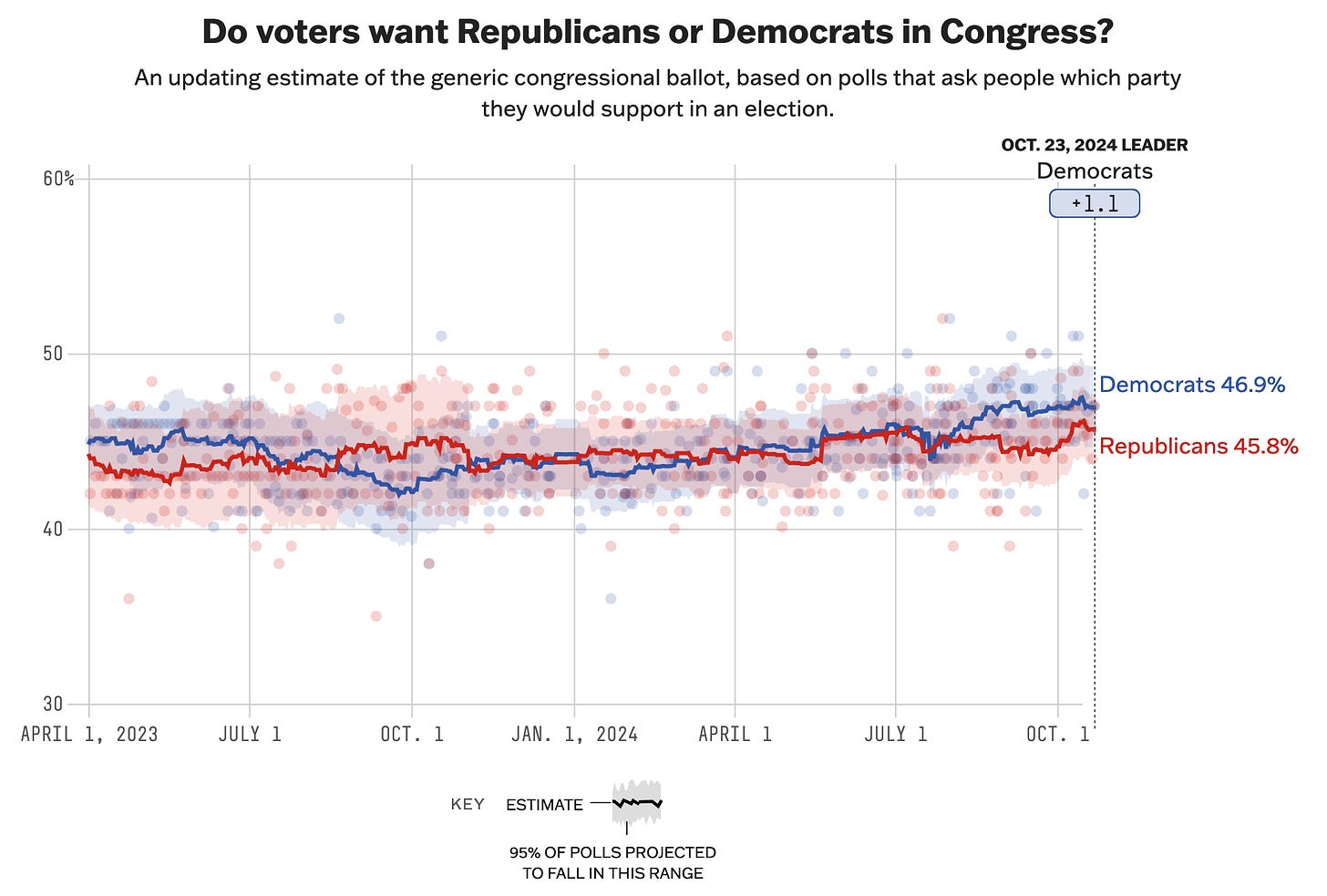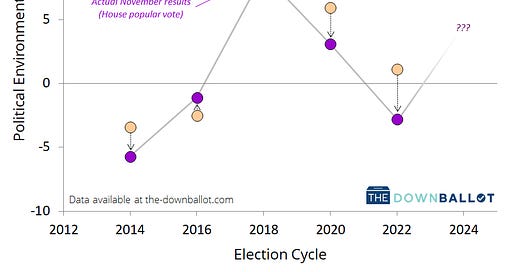Special elections have been strong for Democrats, but polls show a tossup. Which should you believe?
When it comes to the battle for the House, the answer may be "both"
Special elections this cycle are pointing to a strong showing for House Democrats in November, but polling has been considerably less optimistic. So which indicator should you listen to? The answer may be "both."
Across 61 special elections for the House and state legislatures tracked by The Downballot, Democratic candidates, on average, performed 3.5 points better than Joe Biden did in those same districts in 2020. In the nationwide popular vote, Biden won that same election by 4.5 points.
When combined, those two figures suggest an environment where Democrats can expect to win the national House vote by about 8 points. That is to say, if you tote up the votes for every Democratic candidate for the House and do the same for every Republican candidate, Democrats should have an 8-point advantage—comparable to the "blue wave" midterm of 2018, when they gained a net of 40 seats and control of the House.
We know this thanks to rigorous research by Daniel Donner, a contributor to The Downballot who has shown that special elections, taken in aggregate, correlate closely with the results of general elections for the House. This has been the case for decades and remains true today, even though the sort of voters who show up for special elections, as compared to regular elections, tend to look quite different—better educated, older, and whiter, among other things.
But special elections are not the only predictive tool in the forecaster's kit. Until special election analysis came to the fore, the most popular metric for assessing House elections had long been the generic congressional ballot. It's a straightforward question asked by pollsters: Would you vote for the Republican candidate or the Democratic candidate for Congress in your district?
It, too, does a good job of projecting the national House vote, though only as we draw close to Election Day. In odd-numbered years, the generic ballot performs poorly, while special elections do much better. At this point in the cycle, though, timing is no longer a concern.
And the polls right now are telling us something different from the special elections. According to an average of hundreds of surveys calculated by 538, Democrats have only a small advantage of about 1 point. Needless to say, the gap between what the polling is telling us and what the special elections are telling us is considerable.
Estimating how many seats a party might win based on its national House vote is a fraught exercise. The latter doesn't always translate neatly into the former for a variety of reasons: gerrymandering, uncontested races, and simple luck all play a role.
But suffice it to say that Democrats would be very likely to win a majority if the special elections are right, whereas control of the House would be a tossup if the polling is on target.
So what should we make of this divergence? It turns out, there may not be one.
Both approaches, importantly, come with uncertainty built in. You can see this most vividly in 538's poll chart, where shaded regions illustrate the possible range these averages represent, due to the possible sources of error present in all polling. That range plausibly suggests anything from a Republican lead of about 3 points to a Democratic lead of around 5 points.

Calculating the political environment by comparing special elections with presidential results also has error bars. Over the last three election cycles in particular, this method has overshot the national House vote, by about 3 points in 2018 and 2020 and 4 points in the rather unusual 2022 midterms, as seen in the figure at the top of this post.
It's not hard to see, then, that these two measures might in fact meet in the middle, where they overlap. A final Democratic advantage in the House popular vote of around 3 to 5 points is both plausible and in line with both of these metrics.
Other evidence points in this direction as well. The results of primaries in Washington state, which uses a top-two format where all candidates from all parties run together on a single ballot, have also had predictive power.
Aggregating the results of House primaries across the state by party and taking into account demographic trends, a detailed analysis from Split Ticket earlier this year concluded that they pointed toward a roughly 3-point Democratic advantage nationwide in November.
Observers have also spent much of the past year debating whether polls are likely to once again underestimate Republicans, and in particular Donald Trump, just as they did in both 2016 and 2020. But the state of Washington again offers some instructive clues that point in the opposite direction.
As Steve Singiser, a contributor for The Downballot, previously noted, polling of Washington's gubernatorial primary predicted an almost even split, putting Democrats collectively 2 points ahead of Republicans on average. But Democrats wound up winning 55% of the vote to just 43% for Republicans, a 12-point difference. It's unlikely that polls nationwide are underestimating Democrats by 10 points, but the results from Washington suggest they may be too favorable toward Republicans.
But just because the two metrics we're concerned with, special elections and generic congressional ballot polling, might converge does not mean they will converge. They do, however, help to illuminate the outer bounds of what we're likely to see.
On the one hand, polls show an extremely tight race for the presidency and for the House (the popular vote for both of which tends to correlate with each other, although they've often differed by about 3-4 points). There are any number of reasons why the election might be a tossup, whether you point to Joe Biden's unpopularity, the lingering effects of inflation, the possible success of certain GOP attacks such as those on immigration, or other causes.
On the flipside, Kamala Harris' entry into the race generated a groundswell of enthusiasm and a surge in fundraising that has lifted all boats. Polling also shows Harris drawing even with Trump on who would better handle the economy, an issue that had long been a source of strength for Trump. Meanwhile, his much smaller voter outreach program appears to be troubled.
In this rosier scenario for Democrats, the House popular vote could wind up looking much more like the universe the special elections augur rather than the nail-biter the polls are prophesying.
At the same time, it's important to note that there's no hard data pointing to a possible polling miss that could yield a strong night for the GOP. That's not to say such a thing couldn't happen, but if we confine ourselves solely to the available evidence, the range of plausible outcomes stretches from a narrow Republican win to a convincing Democratic victory.






I can sort of follow the analysis but I would not pass a multiple choice test on its contents. That said, if memory serves me well all the votes on abortion access since Roe have gone resoundingly for increased access no matter the redness or blueness of the state. This gives me hope, not enough hope to take my foot off the canvass, phone bank, post card, etc. metal but enough to go to sleep exhausted and wake up in the morning ready to go hard at it again.
If this was a popular vote Trump would not even be in the picture, but because of the undemocratic electoral college the election for President will be a squeaker. But with Husband raising money in Texas and Harris going there to campaign and the Senate race there close it makes me wonder if the Presidential campaign knows something the rest of us are not seeing! With the money advantage and district polls showing House Dems and challengers in good shape my feeling is the Dems capture the House by 5 votes or more. Which leaves me donating my middle-class money to the Senate candidates in Texas and Florida and the independent in Nebraska. Brown in Ohio should squeak through, the rest of the incumbents look like they will be okay, except for Tester who looks lost and Manchin is gone. So with luck or God's help we will hold even or gain one in the Senate! With that the do as little as possible Dems in the governor offices and legislators in the blue states (old and new from the elections) should pass universal vote by mail (as some have done) and combine the local elections with the midterm elections. These reforms boost voter turnout and save tax dollars- wow, Democrats could use for tax cuts for working folks.